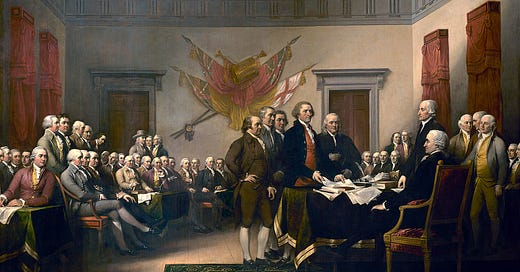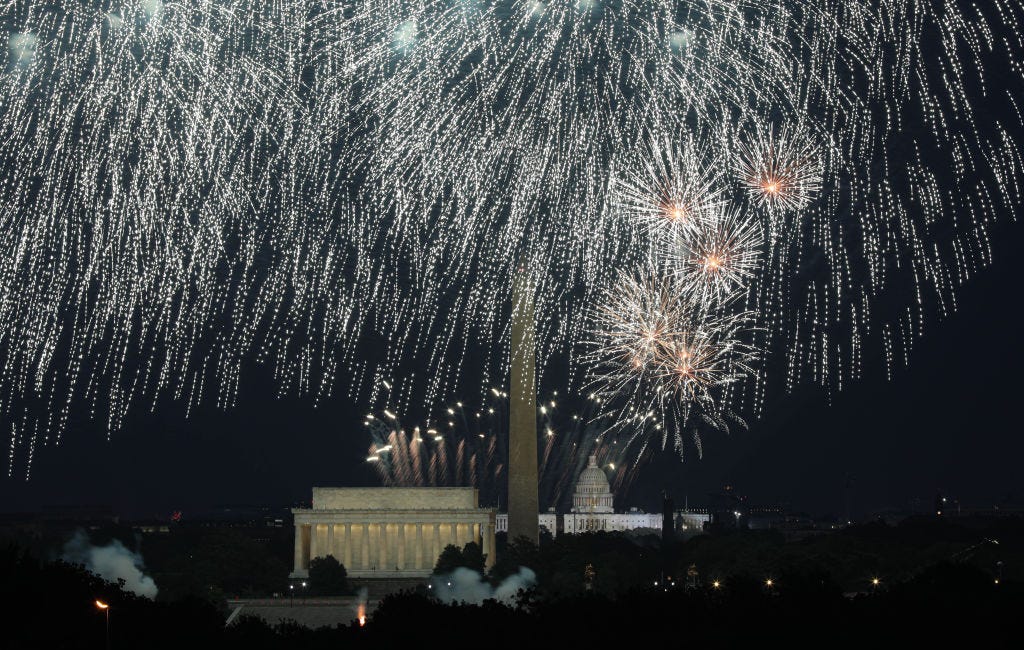As Hakeem Jeffries, the Democratic leader in the House, closed his eight-hour House floor speech, a last-ditch effort to delay the vote on Donald Trump’s budget, he reminded his congressional audience to turn to the Declaration of Independence, which, he told them, “reads like an indictment against an out-of-control king.” The point was lost on some listeners:
And yes, some out there could use a refresher. But it’s always worth returning to the Declaration of Independence on July 4 — and all the more so this year.
That’s because the Declaration is an indictment against an out-of-control King. Thomas Jefferson’s poetic appeal in the introductory paragraphs are what people remember, but much of the document is a list of 27 grievances against George III — the reasons why, “in the Course of human events, it becomes necessary for one people to dissolve the political bands which have connected them with another.”
Those 27 points are worth reflecting on today, an Independence Day that follows the passing of a budget set to make millions of Americans poorer and sicker and turn a huge portion of the federal budget to a massive deportation effort, and a Supreme Court opinion (a clarification in Department of Homeland Security v. D.V.D.) allowing the government to remove people to third countries, without due process — the kinds of things Jefferson and the other contributors to the Declaration of Independence were objecting to in the first place:
For depriving us in many cases, of the benefits of Trial by Jury:
For transporting us beyond Seas to be tried for pretended offences:
The conservative jurist J. Michael Luttig, the former federal judge turned critic of the Roberts Court and the Trump White House, just published his own list of 27 “self-evident truths” for today’s America— an update of the Declaration for our troubled times. You can read it at the link below.
We talked to Judge Luttig yesterday, and present a few excerpts from our conversation that speak directly to how the right-wing Supreme Court majority and the Trump regime have “betrayed the Constitution and America” and threaten the end of the rule of law — important considerations for this July 4.
Having sat with Jefferson's words, obviously, recently to write this piece, but you've sat with them all your life. What do you think Thomas Jefferson would have made of the figure of Donald Trump?
Well, we know that because of the astonishing, astonishing parallels between the 27 grievances of the American colonists in the Declaration of Independence and also the Constitution that followed on the Declaration of Independence, laid side by side, against the words and the actions of the incumbent president of the United States, which is a long-winded way of saying, Anand, that I would have written this identical document had Donald Trump never been president of the United States. With this caveat: the words that I chose are not impervious to the fact that Donald Trump is the president of the United States today.
But I chose those words that I did because of the founding fathers' words and the words of the Constitution of the United States and the decisions of the Supreme Court of the United States over the past 250 years.
Let me just say one other thing to explain that. For instance, one of the 27 truths about both freedom and what I write is that no person should be investigated or prosecuted by the executive on pretext or for reasons of disagreement with the executive, or perceived disagreement by the executive.
Second, I also address in the words of the Declaration of Independence and of the Constitution of the United States that no person, no man, is above the law in the United States of America, notwithstanding the Supreme Court's decision in Trump v. United States to the contrary.
And there were 10 other examples for your audience in which the words I have chosen, I chose because they spoke to the incumbent president and his actions over the past five years.
Judge, you've written unsparingly about ideas like the possible end of the rule of law in the United States, or even the end of the rule of law in the United States.
If I were to say to you, put to you the proposition, one of Chief Justice John Roberts' legacies is presiding over, indeed, egging on the end of the rule of law in the United States, would you quibble with that proposition?
I would cite you and every other interested American citizen to the piece that I wrote for The Atlantic on essentially the 100-day anniversary of the incumbent president's term of office. In that article, as you know, I chronicle most of the president's signature initiatives, if not all of them, in addition to other of his initiatives during his first 100 days in office.
I analyzed them. I concluded that he was without constitutional authority or other authority in the laws of the United States for every single one of those initiatives. And I drew the overall conclusion that when the President of the United States is consciously and deliberately acting contrary to the Constitution and laws of the United States, that portends the end of the rule of law in America. And that's what I believe still today, if it has not become more aggravated since the time I wrote those words.
But I'm wondering if you believe specifically that Chief Justice John Roberts should be thought of as presiding over and egging on that end.
Well, it's a matter of public record now that the Chief Justice was the leading figure behind the court's two decisions in the 14th Amendment case and in the immunity case that I referenced.
The inescapable conclusion from that is that, in my view, he has presided over the court and led the court to those two decisions, which I have publicly said from the moment they were issued. Well, as to the 14th Amendment decision, I wrote that the Supreme Court had betrayed the Constitution and America by abdicating its responsibility to decide that case.
And then, of course, I wrote on the first day that the immunity case came down that it was the single worst decision in American history from the Supreme Court, even worse than Dred Scott and others for the reason that it did structural damage to the Constitution of the United States, unlike and in a different way than any of the prior abhorrent decisions of the Court had done.
So if you rack and stack all of that, Anand, and you're a brilliant person, I can already tell, then my answer to that question would be, yes, the Chief Justice is currently presiding over what I have predicted would represent the end of the rule of law in America.
We encourage you to watch our entire interview with Judge Luttig. Just click on the link below:
What’s at stake is the very essence of the Declaration of Independence and of American identity. That’s what’s under such serious threat now, and it’s what Luttig wrote about in his Atlantic piece in May:
The president of the United States appears to have long ago forgotten that Americans fought the Revolutionary War not merely to secure their independence from the British monarchy but to establish a government of laws, not of men, so that they and future generations of Americans would never again be subject to the whims of a tyrannical king. As Thomas Paine wrote in Common Sense in 1776, “For as in absolute governments the king is law, so in free countries the law ought to be king; and there ought to be no other.”
It’s also worth remembering that though the commitment to the rule of law defines America’s ideals, threats to and failures of the rule of law have been very much a part of the reality of the American experience. The country hasn’t always done so well at living up to the ideals expressed in its founding documents.
Frederick Douglass’s critique, delivered in the Independence Day speech at Corinthian Hall in Rochester, New York on July 5, 1852 that we know today as “What to the Slave is the Fourth of July?” remains one of the keenest analyses of the promise of America, it’s habitual failure to deliver on that promise, and the necessity of working to realize that unfulfilled promise, no matter how much there is left to do.
It’s worth returning to Douglass’s words every year, too.
Fellow Citizens, I am not wanting in respect for the fathers of this republic. The signers of the Declaration of Independence were brave men. They were great men, too, great enough to give frame to a great age. It does not often happen to a nation to raise, at one time, such a number of truly great men. The point from which I am compelled to view them is not, certainly, the most favorable; and yet I cannot contemplate their great deeds with less than admiration. They were statesmen, patriots and heroes, and for the good they did, and the principles they contended for, I will unite with you to honor their memory.
Fellow-citizens, pardon me, allow me to ask, why am I called upon to speak here to-day? What have I, or those I represent, to do with your national independence? Are the great principles of political freedom and of natural justice, embodied in that Declaration of Independence, extended to us? and am I, therefore, called upon to bring our humble offering to the national altar, and to confess the benefits and express devout gratitude for the blessings resulting from your independence to us?
Would to God, both for your sakes and ours, that an affirmative answer could be truthfully returned to these questions! Then would my task be light, and my burden easy and delightful. For who is there so cold, that a nation’s sympathy could not warm him? Who so obdurate and dead to the claims of gratitude, that would not thankfully acknowledge such priceless benefits? Who so stolid and selfish, that would not give his voice to swell the hallelujahs of a nation’s jubilee, when the chains of servitude had been torn from his limbs? I am not that man. In a case like that, the dumb might eloquently speak, and the 'lame man leap as an hart.'
But such is not the state of the case. I say it with a sad sense of the disparity between us. I am not included within the pale of glorious anniversary! Your high independence only reveals the immeasurable distance between us. The blessings in which you, this day, rejoice, are not enjoyed in common. The rich inheritance of justice, liberty, prosperity and independence, bequeathed by your fathers, is shared by you, not by me. The sunlight that brought light and healing to you, has brought stripes and death to me. This Fourth July is yours, not mine. You may rejoice, I must mourn.










For more than 10 years, on the 4th of July, my son has read the Declaration of Independence at the "Speaker's Corner" as part of our city's events. This year, he will again read it, with his 13-year-old daughter. It has never been more meaningful.
It is a sad and shameful day today. As I sit in my backyard and listen to the birds sing, all seems peaceful and right with my privileged world. But I rage and weep for my country and for the looming catastrophe as we abandon democracy as we have known it.